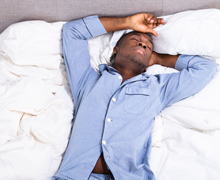
If you have teenagers you may think they don’t get enough sleep, and that may be true, but older people get less. New research from the Medical College of Georgia at Augusta University shows that on average the years in the 40s is when busy Americans get the least amount of sleep during their lifetime.
The sleep pattern for Americans is generally shaped like the letter U going from a lot to a little then back to a lot of sleep during a lifetime. Scientists have found the bottom of that curve coincides with the age of 40 and starts to go back up in the 50s.
Researchers used data from more than 11,000 study participants who wore a device to measure their activity for seven consecutive days. They observed a general pattern of decreased sleep from around the age of 10 that extends into the 50s before it starts to increase again. That pattern happens to be similar to what was seen in large-scale studies in Japan and France.
"We confirmed previous findings based on subjective measurement," Dr. Shaoyong Su, a genetic epidemiologist at the Georgia Prevention Institute and the study's first author said. "People think children and adolescents sleep later and we found this. And, during middle age people sleep less and our findings support that objectively."
The increase of sleep for those in their 60s is reflected in the fact many people retire then and don’t get up as early as they used to. Researchers theorized Health problems are another reason older people may sleep longer.
Scientists found women sleep longer than men across their lives even though they generally go to sleep later and have more interrupted sleep, mainly during the child-rearing years. The end result is about four minutes more sleep on average than men.
"One thing we cannot overestimate is the impact of sleep," said researcher Xiaoling Wang. She said without it you have the tendency to overuse your body and the ability to adjust to less sleep decreases with age.
While poor sleep is a contributing factor in many health issues, it can also be an indication that something is already wrong.
"I think what these sleep parameters mean in terms of people's health is that if you are a physician or other provider and patients comes in with some kind of complaint about their sleep, you need to interpret what they tell you in light of their stage in life and what their likely sleep patterns are going to be," Vaughn McCall says. "I don't look at our findings necessarily as a benchmark of perfect health, I look at this as a benchmark of what is happening in America."
